Concrete Staircase Design
Concrete staircases have a unique design feel all of their own, and the use of concrete in buildings stretches back a long way in our history – the ancient Romans used an early form of concrete and were skilled exponents in this kind of building technology. They developed forms and moulds which allowed them to produce concrete in many different shapes and sizes. Across Europe, they used precast concrete in buildings, bridges and aqueducts for more than 200 years. Precast concrete then largely fell out of use in Europe until it was rediscovered by builders and architects in the late 18th century.
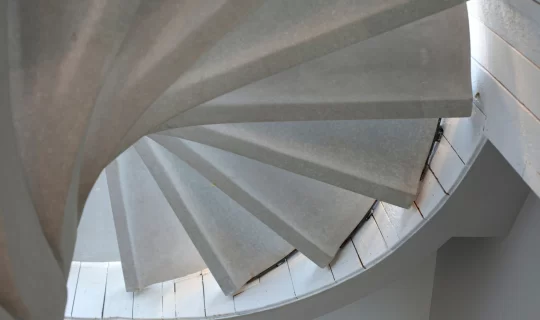
Early in the 20th century, a British engineer called John Alexander Brodie was one of the very first to propose precast reinforced concrete slabs as a way of building houses quickly and cheaply. This building method would eventually spread right around the world.
In the UK, precast concrete was used extensively in the 1950s and 1960s particularly in offices, public buildings and blocks of flats. Some of the designs from this era are very stark and functional – often described as ‘brutalist.’
Today, a much more elegant approach to architecture and design has led to a resurgence of interest in the use of concrete finishes for office and home interiors – and that has led to concrete staircases becoming popular. With their smooth texture, concrete staircases can look extremely stylish and contemporary.
A resurgence of interest in the use of concrete finishes for home interiors has led to concrete staircases growing in popularity. The versatile nature of concrete stairs allows for extremely stylish and contemporary looks. Concrete can suit a variety of staircase designs and is commonly used for treads on spiral stairs, straight-flight spine beam stairs and floating or cantilever stair designs. Concrete stairs can be created on-site where the treads are poured in-situ, or precast in a factory and installed on-site.
There are a number of practical reasons why contractors and homeowners are turning to concrete stairs as an interior design option:
- Straight spine beam staircase
- Due to the low cost of the raw materials, they are relatively economical to produce
- Concrete stairs are very robust and durable
- Concrete stairs will not rot, fade or warp over time
- They require very little maintenance
- Concrete can be used to fill a large space cost-effectively
- They are inherently resistant to fire and therefore can help to enhance fire safety in a building
- Concrete stairs are quiet as they do not create creaks or echoes
- They can help to improve sound-proofing between floors in a building
But over and above these benefits, modern technology enables the creation of some beautiful designs of concrete stairs.
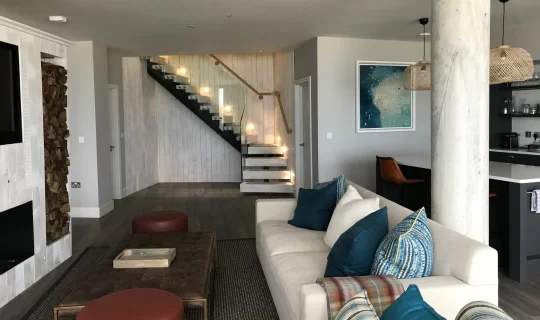
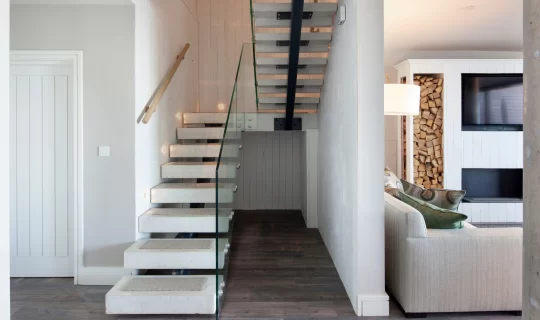
There is an increasing trend for contemporary homes to have concrete walls and floors. So it makes perfect sense to use concrete staircases in order to harmonise with this design approach. They can make a brilliant architectural statement within a building that creates a real centrepiece and focal point. Furthermore, concrete helps to create an imposing sense of solidity and permanence to any building.
Because concrete is a fluid material, it can be poured into virtually any shape. It can also give a very smooth finish that is free of any defects or flaws. This allows for the creation of some arresting and stylish concrete staircase designs, including spiral staircases and curved staircases. These impressive geometric shapes can be used to form a stunning, contemporary design feature. Advances in production technology and computer design have added further momentum to this trend for imaginatively designed concrete staircases. Now it is possible to produce cantilever or floating stairs in concrete, which can make a very impressive feature staircase.
While the natural look of concrete can be very beautiful, concrete stairs also provide a solid base for many other types of finish, such as stone, timber, marble, tiles or carpet inlays. The concrete itself can be given a colour tint or finished with a textured surface or pattern. All these options help to give the customer great scope when specifying their bespoke concrete staircase.
Concrete staircases can look striking when paired with other materials for the balustrade and handrail. For example, the combination of concrete stairs with glass balustrade can create a sleek, stylish and modern look. The use of recessed lighting in concrete stairs can further enhance this effect.
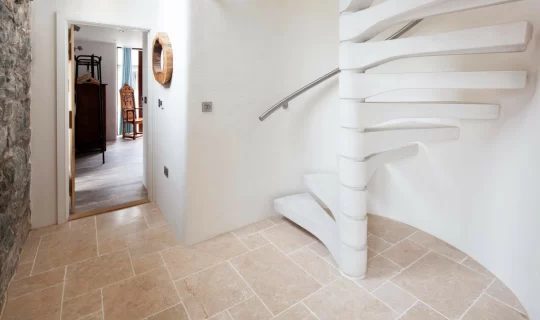
Most of the concrete staircases we produce are installed using precast treads, which are made in-house. The moulds for these are created in fibreglass, the concrete is mixed in the factory and then poured into these moulds over reinforced caged steel. It is possible to pour on-site if required but it is better and more cost effective to precast as it is easier to manage the curing process.
Standards concretes are tested every six months for strength and colour testing is carried out using samples with varying volumes of pigment to colour match. Various types of aggregate and sand are used to produce different surface finishes – a white trowel finish is currently most popular but another common effect is exposed pebble dash. All precast treads are sealed with a silicone based sealant to protect and prolong the life of the stair.
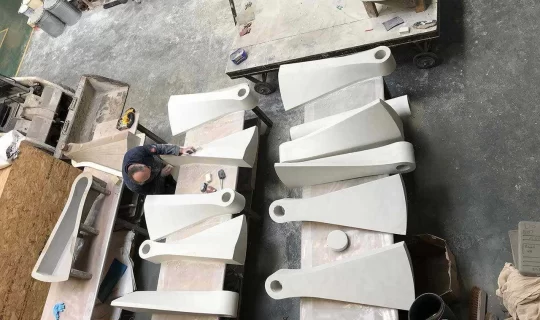
The final finish will depend, to a degree, on the environment and purpose of the stair -depending on how many people are using the stair, it may also need nosing on the edge of the tread, embedded for safety, or trace heating may be required for external installations, to prevent ice forming.
A challenge of production is that in cooler climates, concrete takes longer to cure so its important to keep the temperature consistent to maintain cure time.
It’s fantastic to see the concrete staircase contribute so beautifully to the interior design of a property – adding to a light, airy space or blending seamlessly with a clean, modern look and feel. Long may this trend revival continue!
You will see from the above that the design possibilities for concrete stairs are virtually endless!
At Spiral UK, we have been at the forefront of developments in concrete stairs for over 30 years. Talk to our team about your project and we can show you some amazing staircase design ideas to really fire your imagination. Just get in touch by emailing info@spiral.uk.com or calling us on 0330 123 2447.